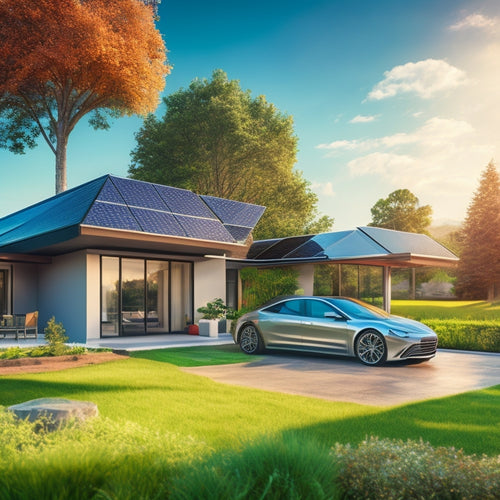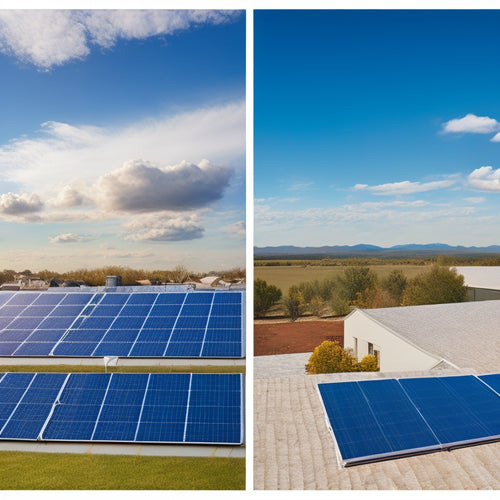
Top Solar Panel Systems for Homes With Battery
Share
You're contemplating investing in a solar panel system with a battery for your home, a decision that can greatly reduce your reliance on the grid and provide backup power during outages. Top-rated solar panel brands like SunPower, Panasonic, and Tesla offer high-efficiency panels and innovative technology. When it comes to energy storage, you'll want to choose a reliable battery backup system that meets your needs, such as the Tesla Powerwall, LG Chem RESU, or Sonnen eco. As you investigate your options, be sure to evaluate key factors like panel efficiency, battery lifespan, and warranty duration. By assessing these key factors, you'll be well on your way to finding the perfect solar panel system for your home.
Key Takeaways
- Top-rated solar panel brands like SunPower, Panasonic, and Tesla offer high-efficiency panels with durability and comprehensive warranties.
- Energy storage systems like Tesla Powerwall, LG Chem RESU, and Sonnen eco provide reliable backup power and smart grid management.
- Key factors to consider when selecting a solar panel system with a battery include panel efficiency, durability, and warranty duration.
- Integrating a solar panel system with an energy storage system can maximize energy savings and leverage solar incentives like the Solar Investment Tax Credit.
- When choosing a solar panel system with a battery, consider the battery lifespan, capacity, and type, as well as installation requirements and maintenance needs.
Top-Rated Solar Panel Brands
When it comes to investing in a solar panel system for your home, choosing a reliable brand is essential. You want a brand that offers high-quality products, innovative technology, and exceptional customer service.
Top-rated solar panel brands like SunPower, Panasonic, and Tesla are leading the way in sustainable energy solutions. These brands are committed to driving solar innovations, providing you with efficient and reliable systems that maximize your energy output.
When selecting a solar panel brand, consider factors such as panel efficiency, durability, and warranty. Look for brands that offer high-efficiency panels with low degradation rates, guaranteeing your system continues to perform at its best over its lifespan.
Additionally, consider brands with thorough warranties that cover both parts and labor. By choosing a reputable brand, you can guarantee a smooth shift to sustainable energy and enjoy the benefits of reduced energy bills and a lower carbon footprint.
With the right brand, you can utilize the power of solar energy and take control of your energy needs.
Energy Storage System Options
You'll need to reflect on energy storage system options to guarantee a steady power supply during outages or when the sun isn't shining.
You have two primary choices: battery backup options, which provide power during grid outages, and various energy storage types, such as lithium-ion or lead-acid batteries, each with their own advantages and limitations.
Battery Backup Options
Battery backup options, also known as energy storage systems (ESS), play an essential role in ensuring a steady supply of electricity to your home even when the grid is down or during periods of low solar energy production.
When choosing a battery backup option, you'll want to evaluate factors that impact its performance and longevity.
One critical consideration is battery lifespan, which can range from 5 to 15 years or more, depending on the type and quality of the batteries.
You'll also need to think about installation requirements, including the physical space needed for the battery bank and the electrical infrastructure required to connect it to your solar panel system and home electrical system.
Additionally, you'll need to assess the overall capacity of the battery bank, which will determine how much electricity you'll have available during an outage.
Energy Storage Types
Several energy storage types are available for homes, each with its unique characteristics, advantages, and disadvantages. When evaluating energy storage for your solar panel system, you'll want to assess the options based on your specific needs and goals.
Lead-acid batteries are a cost-effective option, but they've a shorter lifespan and lower depth of discharge compared to lithium-ion batteries. Lithium-ion batteries, on the other hand, offer higher efficiency, longer lifespan, and deeper depth of discharge, but they come at a higher upfront cost.
You'll also need to assess the type of energy storage system that best suits your needs. AC-coupled systems connect to your existing electrical panel, while DC-coupled systems connect directly to your solar panel system.
DC-coupled systems can provide more efficient charging and discharging, but AC-coupled systems offer more flexibility. When evaluating energy storage options, don't forget to assess battery lifespan considerations, as they can impact the overall cost-effectiveness of your solar energy benefits.
Best Battery Backup Systems
You'll want to take into account a battery backup system that integrates seamlessly with your solar panel system, providing a reliable source of power during outages.
When selecting a battery backup option, you'll need to assess energy storage systems that meet your home's specific power requirements.
Battery Backup Options
When the grid goes down, a reliable battery backup system can be a homeowner's best friend, providing a seamless shift to backup power and ensuring continuous operation of essential appliances.
You have several battery backup options to choose from, each with its unique characteristics.
Deep cycle batteries, like lead-acid or lithium-ion, are designed to provide a steady flow of power over an extended period. They're ideal for whole-home backup systems.
You'll want to evaluate the battery lifespan, typically ranging from 5 to 15 years, depending on the type and quality. Discharge rates are also vital, as they affect how quickly the battery can supply power to your appliances.
Some battery backup systems come with advanced features like smart monitoring and automatic switching. These features enable you to track your energy usage and receive alerts when the grid goes down.
With the right battery backup option, you can enjoy uninterrupted power supply and peace of mind during outages.
Energy Storage Systems
Investigate the top energy storage systems on the market, designed to provide reliable backup power for your home.
You'll want a system that integrates seamlessly with your solar panel system, ensuring a smooth shift to backup power during grid outages. Look for systems that offer high energy efficiency, as this will maximize the amount of usable energy stored.
Some top energy storage systems include the Tesla Powerwall, LG Chem RESU, and Sonnen eco. These systems are designed to provide long-lasting backup power, with capacities ranging from 9.8 kWh to 16 kWh.
When choosing an energy storage system, consider factors such as depth of discharge, round-trip efficiency, and warranty duration. Additionally, be aware of renewable incentives, such as the Solar Investment Tax Credit (ITC), which can help offset the cost of your system.
Home Power Solutions
As you've selected an energy storage system that meets your needs, it's time to contemplate the best battery backup systems for your home power solution.
When choosing a battery backup system, consider your home energy management requirements. Look for systems that can seamlessly integrate with your solar panel system and provide reliable backup power during grid outages.
In line with renewable energy trends, top battery backup systems should offer advanced features such as load shifting, peak shaving, and smart charging. They should also have a high depth of discharge (DOD), guaranteeing maximum energy utilization.
Additionally, consider the system's scalability, as your energy needs may change over time.
Some of the top battery backup systems for home power solutions include the Tesla Powerwall, LG Chem RESU, and Sonnen eco.
These systems are designed to provide efficient, reliable, and sustainable energy storage solutions for your home. By integrating these systems with your solar panel system, you can guarantee a consistent and efficient supply of power, even during grid outages.
Solar Panel Efficiency Ratings
Your solar panel system's efficiency rating is a critical factor in determining how much electricity it can generate from the sun's energy. A higher efficiency rating means your system can produce more power per hour of sunlight.
When shopping for a solar panel system, look for high-efficiency panels with ratings above 20%. These panels will give you the most bang for your buck, especially if you have limited roof space.
Efficiency improvements have been a major focus in the solar industry, leading to significant advancements in recent years. Manufacturers have made strides in reducing energy losses and improving conversion rates.
As a result, today's solar panels are more efficient than ever, with some models boasting ratings as high as 23%. A more efficient system also means a longer solar panel lifespan, as it can generate more power over its lifetime.
When evaluating different systems, consider the efficiency rating and how it will impact your energy output over time. By choosing a high-efficiency system, you'll get the most out of your solar investment.
Key Features to Consider
The type and quality of solar panels, inverters, and mounting systems you choose will greatly impact your solar panel system's overall performance and longevity. You'll want to take into account the efficiency ratings, durability, and warranty of each component. Additionally, you should think about the installation process, including the requirements for installation permits and potential solar incentives in your area.
When evaluating solar panel systems, take into account the following key features:
| Feature | Description | Importance |
|---|---|---|
| Panel Efficiency | The percentage of sunlight converted to electricity | High |
| Inverter Type | String inverters, microinverters, or power optimizers | Medium |
| Mounting System | Roof-mounted, ground-mounted, or tracking systems | Medium |
You'll also want to take into account the system's monitoring and maintenance capabilities, as well as the manufacturer's reputation and customer support. By carefully evaluating these key features, you can ascertain that your solar panel system meets your energy needs and provides a strong return on investment.
Average Cost and Savings
Evaluating the financial aspects of a solar panel system is an essential step in the decision-making process.
You'll want to understand the average cost and potential savings to determine if investing in a solar panel system with a battery is right for you.
The average cost of a solar panel system with a battery can range from $15,000 to $30,000 or more, depending on the size of the system and the type of equipment used.
However, there are financing options available to help make the upfront cost more manageable.
Here are some key cost savings to take into account:
-
Reduced electricity bills: Solar panels can greatly reduce your electricity bills, saving you hundreds or even thousands of dollars per year.
-
Tax incentives: You may be eligible for federal and state tax incentives, which can help offset the cost of the system.
-
Increased property value: Installing a solar panel system can increase your property value, potentially enhancing your selling price if you decide to sell in the future.
Installation and Maintenance Needs
Proper installation is vital to guarantee your solar panel system operates at its maximum potential. You'll want to ascertain that your installer uses first-rate installation techniques to optimize energy production. This includes orienting the panels at the ideal angle and direction to capture the most sunlight.
Additionally, a secure and weather-tight mounting system is essential to prevent water damage and guarantee the system's longevity.
When it comes to maintenance, you'll need to perform regular checks to verify your system is running smoothly. This includes inspecting the panels for debris, cleaning them periodically, and monitoring the system's performance.
You should also keep an eye out for any signs of wear and tear, such as loose connections or damaged components. By staying on top of maintenance, you can identify and address any issues before they become major problems.
Following these installation and maintenance tips will help you get the most out of your solar panel system and enjoy long-term energy savings.
Top System Recommendations
Now that you've confirmed your solar panel system is installed and maintained correctly, it's time to focus on the system itself.
With the right system in place, you can maximize your energy savings and take advantage of solar incentives. Here are three top system recommendations to evaluate:
-
Tesla Powerwall: This popular battery system is designed to work seamlessly with your solar panels, providing backup power during outages and reducing your reliance on the grid. Its sleek design and user-friendly interface make it a top choice for homeowners.
-
LG Chem RESU: This high-performance battery system offers exceptional efficiency and flexibility, allowing you to customize your energy storage needs. Its compact design and installation tips make it easy to integrate into your existing solar panel system.
-
Sonnen eco: This intelligent battery system is designed to optimize your energy usage, providing real-time monitoring and control. Its advanced features, such as smart grid management, make it an excellent choice for homeowners looking to maximize their energy independence.
Frequently Asked Questions
Can I Use a Solar Panel System With a Septic System?
You can integrate a solar panel system with your septic system, as they're separate entities, but make certain you follow local building codes and regulations to avoid any potential electrical or water contamination issues.
Do Solar Panels Work During a Power Outage Without a Battery?
You think solar panels would be the ultimate power outage solution, but surprisingly, they won't work during an outage without a battery, as they're designed to sync with the grid, not provide standalone power - but with a battery, they can be your reliable backup.
How Long Does It Take to Install a Solar Panel System?
You'll spend around 3-5 days on the installation process, depending on system complexity and crew size, with the installation timeline varying from 1-3 weeks from permit approval to final inspection, ensuring a smooth changeover to renewable energy.
Can I Add More Batteries to My System in the Future?
You'll be relieved to know that, yes, you can add more batteries to your system in the future, allowing for seamless battery expansion and increased energy storage capacity as your power needs evolve.
Are Solar Panels Resistant to Hail and Extreme Weather?
You'll be relieved to know that most solar panels are designed to withstand hail damage and extreme weather conditions, featuring weather durability ratings that guarantee they can tolerate heavy hailstones and intense storms without compromising their performance.
Related Posts
-

What Solar Panels Work Best With EVS Online?
When shopping for solar panels online to power your electric vehicle, look for high-efficiency models that can withst...
-

What Makes a Road Bike-Friendly by Design?
As you plan and design roads, incorporating features like dedicated bike lanes, smooth surfaces, and traffic calming ...
-

Tracking Solar Panels Vs Fixed Panels Cost Savings
When considering solar panel options, you'll want to weigh the cost savings of tracking solar panels versus fixed pan...


